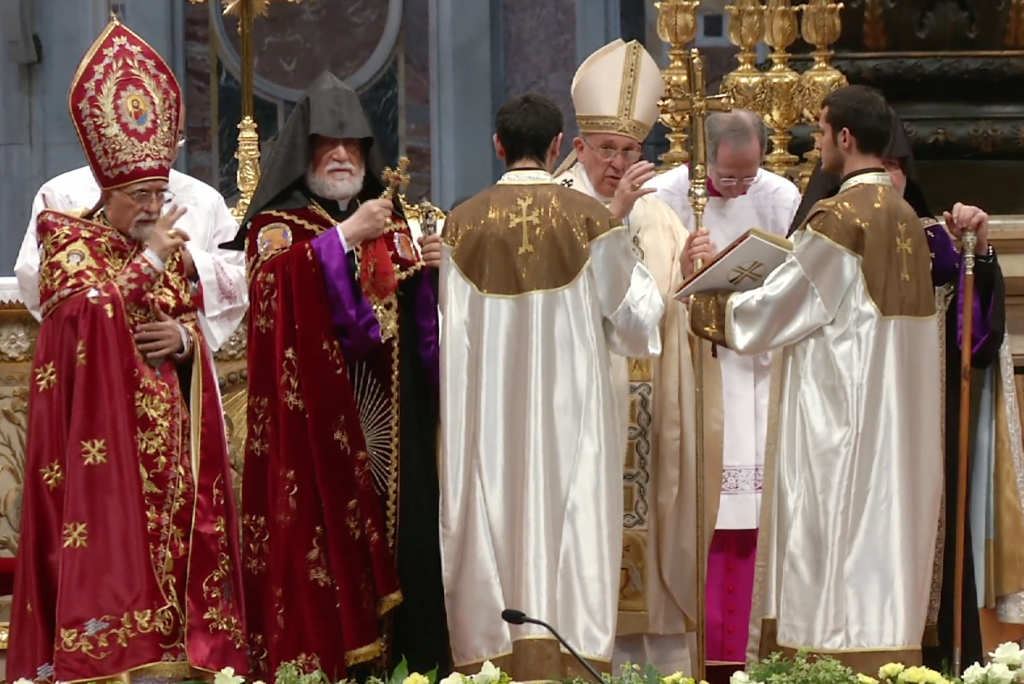
In over 20 years working as a journalist, I don’t think I’ve ever covered a story where one word counted so much. Genocide.
Prior to Pope Francis’ Mass on April 12th to mark the 100th anniversary of the slaughter of Armenians by Ottoman Turks, we debated the question all week. Will Pope Francis use the word genocide? I spoke to Vatican journalists, I spoke to Armenian officials and I spoke to Turkish journalists and every last one of them told me they did not think he would.
I was a bit perplexed. Pope Francis is known for being forthright and not beating about the bush.
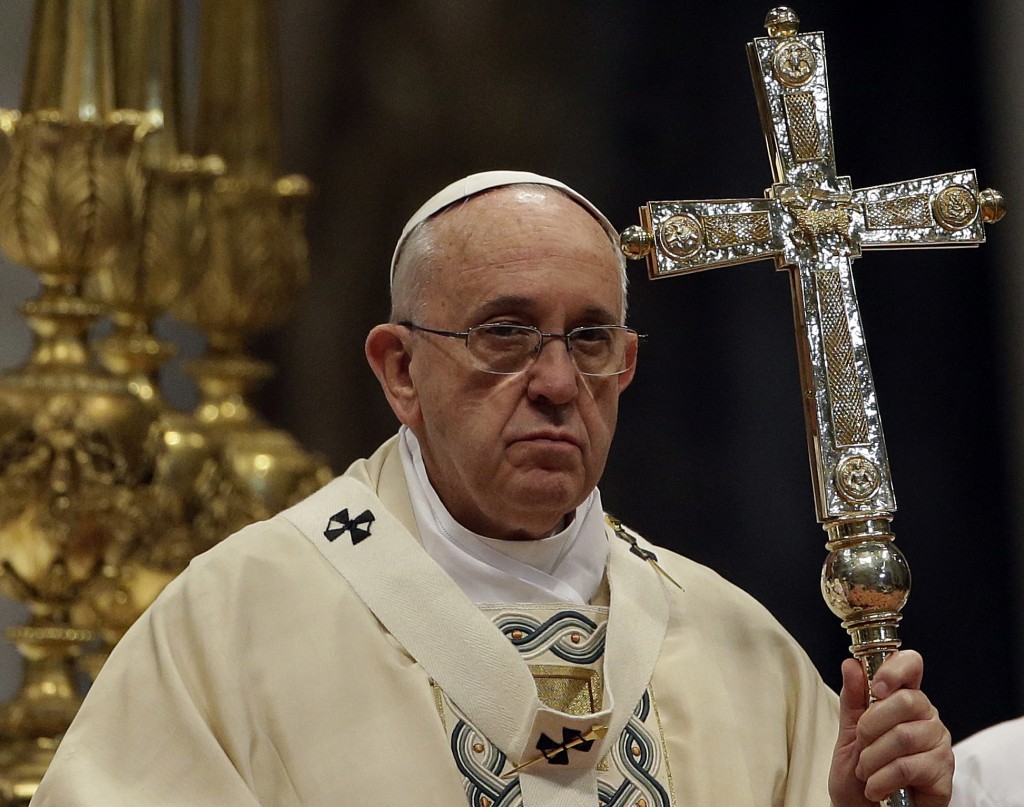
My colleague Nicole Winfield, AP Rome Bureau Chief, pointed out to me that when Pope Francis was Cardinal Jorge Mario Bergoglio in Buenos Aires he was close to the Armenian community. Nicole and I confirmed this when we were invited to a gala dinner a few nights ahead of the mass with Armenian President Serzh Sargsyan and had a brief moment to chat with the President.
But speaking to Turkish colleagues inside Saint Peter’s just before the Mass, they convinced me that the Pope would not do it. They said it would create too many problems with Turkey and that if he did say “genocide” the reaction by the Turkish government would be fast and furious.
The Mass started. Pope Francis came straight down the center aisle of Saint Peter’s walked up to the altar and delivered a greeting that blew us all away.
He started out…
“…today we are experiencing a sort of genocide created by a general and collective indifference….in the past century our human family has lived through three massive and unprecedented tragedies. The first, which is widely considered “the first genocide of the 20th century” struck your own Armenian people, the first Christian nation, as well as Catholic and Orthodox Syrians, Assyrians, Chaldeans and Greeks. Bishops and priests, religious, women and men, the elderly and even defenseless children and the infirm were murdered.”
I was standing with AP cameraman Luigi Navarra and two colleagues from Turkey on a platform for TV cameras at the side of St. Peter’s Basilica. We looked at each other in shock and muttered, “he said it!!”. I rifled through my purse for my cell phone and squatted down between the tripods to call Nicole Winfield – “Do you hear that???!!!” I whispered. “I’ve just filed an alert,” she responded calmly.
So then I frantically took notes on the rest of the speech and began to tweet.
The Pope went on:
“The remaining two were perpetrated by Nazism and Stalinism. And more recently there have been other Mass killings, like those in Cambodia, Rwanda, Burundi and Bosnia. It seems that humanity is incapable of putting a halt to the shedding of innocent blood.”
I tweeted “#PopeFrancis does not mince words. Refers to “genocide” 2 times in mass with Armenians
The Pope continued passionately, “It seems the human family has refused to learn from its mistakes caused by the law of terror, so that today too there are those who attempt to eliminate others with the help of a few and with the complicit silence of others who simply stand by. We have not learned yet that war is madness”
As he headed towards his conclusion, Pope Francis said:
“Dear Armenian Christians, today, with hearts filled with pain but at the same time with great hope in the risen Lord, we recall the centenary of that tragic event, that immense and senseless slaughter whose cruelty your forebears had to endure. It is necessary, and indeed a duty, to honour their memory, for whenever memory fades, it means that evil allows wounds to fester. Concealing or denying evil is like allowing a wound to keep bleeding without bandaging it!”
I tweeted:
#PopeFrancis at Mass for 100 anniversary of #ArmenianGenocide “where there is no memory evil keeps the wound open and allows it to bleed”
WOW! Talk about calling a spade a spade. Talk about not mincing words. This Pope doesn’t mess around.
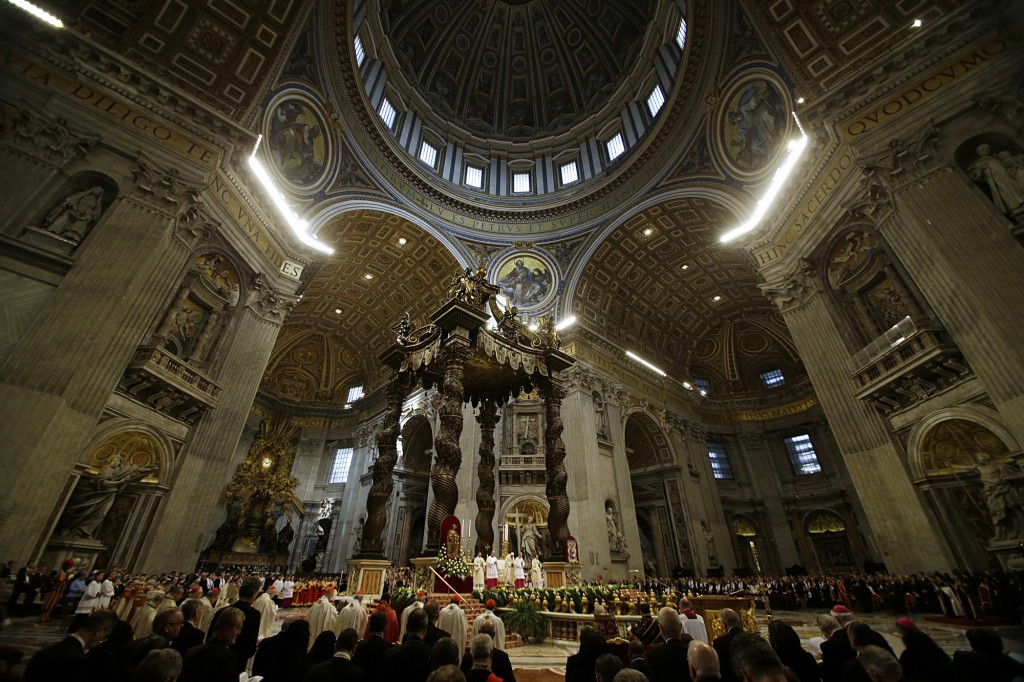
The Turkish government doesn’t mess around either. Shortly after the Mass, the Turkish government summoned the Vatican Ambassador to Turkey for a dressing down and then the Turkish ambassador to the Vatican was recalled for consultations. Turkish Foreign Minister Mevlut Cavusoglu tweeted “The Pope’s statement, which is far from historic and legal truth, is unacceptable.”
Turkish President Recep Tayyip Erdogan urged Pope Francis not to repeat his “mistake” of calling the slaughter of the Armenians a “genocide.”
According to the English language Turkish daily the “Hurriyet Daily News”, Erdogan told a meeting of the Turkish Exporters Assembly on April 14th:
“Whenever politicians, religious functionaries assume the duties of historians, then delirium comes out, not fact. Hereby, I want to repeat our call to establish a joint commission of historians and stress we are ready to open our archives. I want to warn the pope to not repeat this mistake and condemn him.”
(A little aside here, I covered the Pope’s visit to Turkey and his meeting with President Erdogan in November 2014 – see blog post: Pope Francis in Turkey- Post 1 and even back then the relationship between Erdogan and Pope Francis did not seem very warm and fuzzy) Nevertheless, Erdogan referring to Pope Francis’ comment as “delirium” is a clear indication of his government’s anger.
So back to the question of the Armenian “genocide”. I have never studied the history of Turkey and the Ottoman Empire in the first half of the 20th century so I will just quote what my colleague Nicole wrote in the AP wire:
“Historians estimate that 1.5 million Armenians were killed by Ottoman Turks around the time of World War I, an event widely viewed by scholars as the first genocide of the 20th century.”
Turkey denies that is was a genocide and both the United States and Italy have not ever officially recognized the massacre as a genocide.
So what does the word “genocide” mean and what qualifies as a genocide? A little fishing around the web and I have come up with the official United Nations’ definition from 1948
“Genocide is defined in Article 2 of the Convention on the Prevention and Punishment of the Crime of Genocide (1948) as “any of the following acts committed with intent to destroy, in whole or in part, a national, ethnical, racial or religious group, as such: killing members of the group; causing serious bodily or mental harm to members of the group; deliberately inflicting on the group conditions of life calculated to bring about its physical destruction in whole or in part; imposing measures intended to prevent births within the group; [and] forcibly transferring children of the group to another group.”
This definition seems a bit vague to me. How many people have to die to call it a genocide?
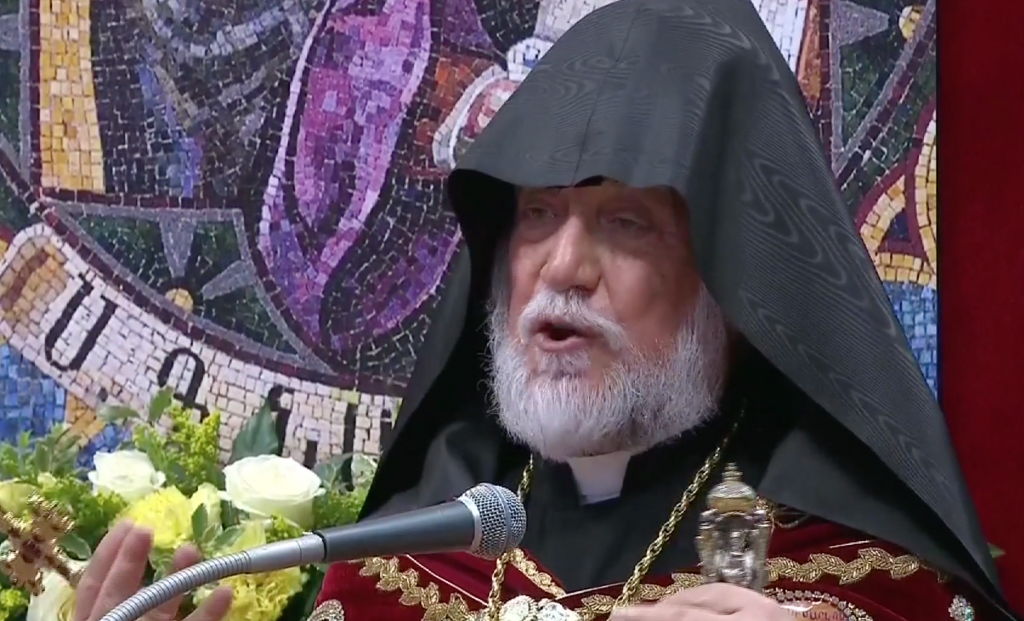
So, why so much sensitivity about what seems in the case of the killing of the Armenians an obvious genocide. During the Mass I was struck by the powerful words of some of the Armenian leaders present. Aram I, Head of the Armenian Apostolic Church stood on the altar in St. Peter’s and declared forcefully in English: “According to International law, genocide is a crime against humanity and international laws spells out clearly that condemnation, recognition and reparation of genocide are closely interconnected.” Earning the applause of the hundreds of people gathered in the Basilica.”
Ah, reparations. That is a whole other issue that I will not get into.
And if that was not enough for one papal event, following the Mass, the Pope issued a message to all Armenians in which he said:
“It is the responsibility not only of the Armenian people and the universal Church to recall all that has taken place, but of the entire human family, so that the warnings from this tragedy will protect us from falling into a similar horrors, which offends against God and human dignity. Today too, in fact, these conflicts at times degenerate into unjustifiable violence, stirred up by exploiting ethnic and religious differences. All who are Heads of State and of International Organizations are called to oppose such crimes with a firm sense of duty, without ceding to ambiguity or compromise.”
So not only was the Pope unabashedly using the word “genocide” he also called on other heads of state to do so. Is the Pope accusing the US, Italy and other nations of ambiguity and compromise? It certainly sounds like it.
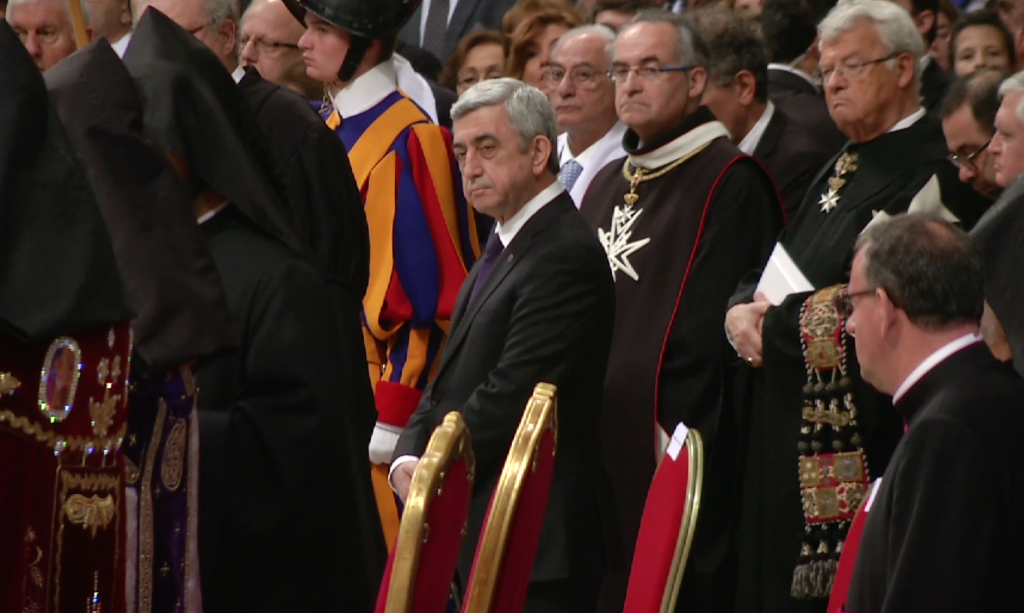
Following the Mass, I hopped in a taxi with Luigi and Nicole and rushed from the Vatican to Via Veneto where we had an interview with the Armenian President at the plush Baglioni Hotel. The Armenians were packed in the lobby clearly rejoicing in the moment. Up in his suite, President Sargsyan was positively glowing., “I think that Pope Francis has delivered a powerful message to the international community,” he told us, adding “We are getting messages from Armenians all over the world who are touched by this message. They consider that this 100 years long fight for recognition is still going on, but there are already significant results.”
I wanted to write a blog post on this topic earlier, but I have not had the energy and feel unable to tackle the full question. I exchanged emails with a Turkish friend who said while he personally believes the slaughter of the Armenians was genocide and needs to be recognized as such, there are many delicate issues among which the question of reparations and the intermingling of Turkish and Armenian blood. He wrote me the following:
“Another factor is that there is so much mixed Turkish and Armenian blood among present day Turks. For example, my grandmother’s family adopted an Armenian orphan during that time period in Erzurum where my mother’s family is from. She was found naked in a field and they knew she was Armenian because of the Christian tattoo on her arm. She was adopted by the family and raised as a Muslim but was found one day burying a necklace with the Armenian cross in the backyard for fear of someone finding it – years after being adopted around age 8. So she had a sense of the danger. We are not the only family that has mixed blood of this nature. I think somehow admitting the genocide interacts with not wanting to reveal the mixed blood.”
Since this blog is about being a mother, I would like to conclude on this moving story of this child. The debate has been about a word, but as usual it is the children who are always caught in the middle. My heart goes out to that young girl with her little Christian tattoo on her arm. She was adopted by a kind and generous Muslim family, yet was still frightened enough to bury her necklace with a cross in the yard.
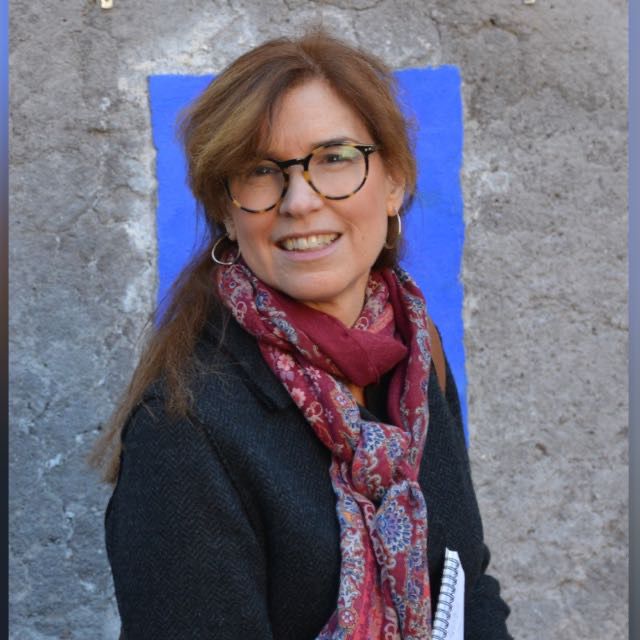
Somewhat beside your point, but I’m a bit surprised (and disappointed) that apparently Rwanda was not a genoicide per the Pope? I believe it meets the definition of genoicide exactly (it’s the only one of the “mass killings” he referenced that I know much about).
He did mention Rwanda as a genocide. Here is the quote:
“The remaining two were perpetrated by Nazism and Stalinism. And more recently there have been other Mass killings, like those in Cambodia, Rwanda, Burundi and Bosnia. It seems that humanity is incapable of putting a halt to the shedding of innocent blood.”
Ah, wait a minute, I see what you are saying…you think he is referring to Nazism, Stalinism and the Armenian genocide as Genocide and the others as “mass killings”. I interpreted it as though he was calling the entire list genocide. I can’t imagine he would call Cambodia and Rwanda genocide.
He seemed to preface his remarks indicating there were 3 genocides (hence “the remaining two”), the rest were just mass killings. Odd. I don’t like it.
I am not sure I read it that way, but I could be wrong. The Pope is expected to go to Africa at the end of this year — not sure where yet, but there will be opportunity there to comment on these things and I assume he will. He usually does hold back.
A superb post – I am so grateful that you wrote on this. And so grateful to the Pope for his clear words, and his linking together of so many heinous events. NPR here has had a lot of reflection on this history and on the debate over the word genocide, and one scholar cited the mass slaughter because of religion and culture, designed to ‘purify’ the land (there seems to be so much of that, all over the world, then and now). I’ve known many of Armenian descent who worshipped in our churches (there were Congregational missionary teachers in Turkey and Armenia who gave great aid to the Armenians then, and many of their important documents about the genocide are stored in the Congregational archives in the US) and many Armenians in the US became Congregational. And the Pope is right that the denial of their history is a continual wound. The recognition this week by many must be a balm for them.
On a different note, the photos (!) show the first male burka-like garments I have seen. Are these their usual headdresses, or are they a mourning thing? And the names! Is this guy really addressed as His Beatitude!! I would so liked to have been there, to worship with them. But I think I might have gotten the giggles over the titles –
There are many Armenians in the Boston area, and in all their shops and restaurants there are murals of the Armenian land, part of that longing for home, and holding on to their sense of where they belong, which was ripped from them by the Turks who said with violence, You do not belong here. So I would guess that the right to live on certain lands is part of the problem here, as well as the mingled blood your friend cited, which is part of the root of shame that caused the genocide in the first place, isn’t it?
Aren’t the photos great! I love their outfits. This Pope is really toning down the dress-code at the Vatican (Benedict XVI liked more elaborate clothing) so it is fun for us to photograph/film the clothing of some other religious groups that come visiting (including the Armenians). And on the titles — I was using the official title given in the documents by the Vatican press office, so I assume “His Beatitude” is correct. “Beato-lui” – (Lucky him) as they say in Italian. It is interesting that I do not know any Armenians in Italy, but I remember lots of Armenian kids in my highschool growing up (Newton, Mass) and I think there is a large Armenian diaspora in the Boston area. I wish I had taken more time to hear their stories. I should see if I can find the NPR reports on line, I would be interested in hearing them. I am still totally unclear on what is a genocide. What about the white Americans coming in and wiping out the Native Americans — does that count as genocide? I have no clue. What about the US dropping the bombs on Hiroshima and Nagasaki. I know that was a war situation, but it is pretty atrocious to think about it. I think the Turks should accept the fact of the Armenian genocide as should the rest of us accept some of the ugly acts our nations have carried out.
Thanks Trish for this powerful post. My great grandparents lost their lives in the genocide just months after sending my grandparents to the U.S. 102 years ago.
Coffee’s on me Sunday.
Well, now you’ve intrigued me. I want to hear more about your family’s story — over coffee on Sunday. Looking forward to seeing you and Linda.
Thanks, Trisha. You have written another story that has added to what I know about the situation beyond what the Pope said and the Turkish president did. And you have, as often, put a very human face on the story by talking to Armenian people and your Turkish friend and also by the moving story about the little girl.
A presto
Thank you Joan. I was so moved by the story of the little Armenian girl that my Turkish friend told me about. Next time I see him I want to know the rest of the story. What happened when she grew up? Did remain a Muslim, did she marry a Turk, did she have a family? Such a fascinating tidbit of personal history and I want to know more.
Facinating story thankyou Trisha! I didn’t know much about this side of WW1 so googled it and the first site was Genocide of Armenians. What a horror! Today in Australia marks the 100th anniversary of remembering the battle at Gallipoli, Turkey which resulted in the death of many Australians and New Zealanders against those same forces. We call it ANZAC Day and many Australians have travelled to the site, this time welcomed by Turkey. Although I wont be attending any services, at least the “celebrations” bring attention to the folly of war. Unfortunately as the Pope said we do not learn from these mistakes.
Paula — Thank you so much for this comment and telling me about the 100th anniversary of the battle of Gallipoli. I know so little about that too. Gosh, I am feeling like a real ignoramus these days. I did read a beautiful novel once that had a bit about that. If you ever get a chance you should read it, “Birds Without Wings” by Louis De Bernieres. As you say, it is so sad that we never do seem to learn from our mistakes on the folly of war.
Bravo to Pope Francis once more for taking a stand with the oppressed. And Armenians being slaughtered by the thousands certainly sounds like oppression – no, genocide, to me. I haven’t read as much as I should, but after reading “La Masseria delle Allodole,” (The Farmhouse of the Larks), I was horrified reading what horrors human beings can influct on other human beings. A movie was made of the book too, and uf you can stomach the atrocities shown, it’s an excellent film. Another great post Trisha.
Hi Linda, I have never heard of the book or the movie “La Masserie delle Allodole” (The Lark Farm). I must read it or see the film (although it sounds like one has to gird oneself for it.) I certainly feel very ignorant about the Armenian genocide and I think I am not alone. It is amazing how little about the Armenian Genocide is taught in schools, I hope that will change.